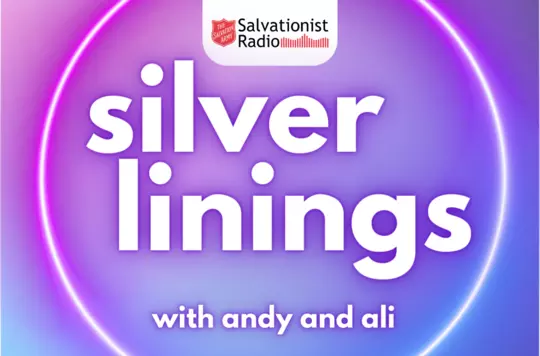14 September 2024
Staying afloat: Trusting in God when you're overwhelmed
Major Howard Webber
Major Howard Webber hears a desperate cry for help.
Key text
When I was a boy, our family went to Frensham Great Pond in Surrey for the day. One of my brothers and I went into the water to play ball. However, every time I threw it to my brother he returned it just out of my reach. Gradually I went into deeper water. I couldn’t swim back then, so, when the water reached my neck, I pleaded with him not to throw it so far.
Did he take any notice? Next time he threw it, it was about a foot beyond my hand. ‘I only need take one quick step and then step back,’ I thought. When I did, there was nothing under my foot and I sank. Panic! Fortunately, somehow, I reached solid ground and safety.
In Psalm 69, we read that David feels overwhelmed, helpless and doomed by insurmountable troubles. His many enemies look set on destroying him. He has sought God, cried out to God for rescue, all to no avail – or so it seems.
Pause and reflect
- Have you ever been so helpless, up to your neck in troubles, with God seeming a million miles away?
Many view Psalm 69 as a prophetic psalm about Jesus. Verse 3 reminds us of Jesus crying out to his Father when he was on the cross: ‘My God, my God, why have you forsaken me?’ (Matthew 27:46). Jesus’ throat, too, was parched (see John 19:28).
Verse 4 reminds us that Jesus was also hated without reason (see John 15:25). He suffered for wrong that he had not done. In his case, he chose to suffer that we, the wrongdoers, might be free.
David doesn’t claim to be sinless (see v5), but he feels that what he is experiencing is unwarranted. He is also concerned about the effect the scorn and shame he has received might have on other faithful souls.
Even David’s family seem to have distanced themselves from him. This again echoes Jesus’ experience: ‘even his own brothers did not believe in him’ (John 7:5) and, on one occasion, they suggested that ‘he is out of his mind’ (Mark 3:21). John 1:11 states that Jesus ‘came to that which was his own, but his own did not receive him’. When David expresses his devotion and zeal in weeping and fasting and putting on sackcloth, we read in our study passage that he is met with ridicule and mockery (see vv9–12).
Pause and reflect
- How ready are we to stand out from the crowd in our love and witness for Jesus?
- Does fear of ridicule or mockery hold us back?
Although David is worn out calling for help and looking for God, he does not give up. Rather, he persists in pleading, just as Jesus said we ought to do (see Luke 11:5–10). David cries out ‘rescue me’ and ‘deliver me’ (v14) and ‘answer me’ and ‘turn to me’ (v16). He doesn’t doubt that God is full of goodness and love or that God knows all that he is going through (vv16 and 19).
Verses 19 to 21 of the psalm could very well be describing Jesus hanging on the cross. There, Jesus found no comfort as the chief priests and teachers of the law mocked him: ‘“He saved others,” they said, “but he can’t save himself!”’ (Mark 15:31). Someone offered Jesus wine vinegar to drink (see Mark 15:36). Jesus’ friends had either deserted him or watched from a distance (see Mark 15:40).
It is not unusual to be angry when we have been mistreated, or to want those responsible for our suffering to suffer themselves. In verses 22 to 28 of the psalm, David appears to be appealing to God to rain down terrible punishment on those who are causing him such grief.
Pause and reflect
Have you ever been so angry at the way you’ve been treated that you’ve wanted the very worst for those who have hurt you? Consider how this compares with Jesus’ prayer at Calvary: ‘Father, forgive them, for they do not know what they are doing’ (Luke 23:34).
Verse 21 is seen as a reference to Jesus (see John 19:28 and 29). You can also compare verse 9 with Jesus’ words in John 2:17. In that context, verses 22 to 28 of the psalm appear more a description of God’s ultimate punishment for those who reject Jesus, than David calling for vengeance on his enemies. The writer of Romans 11:9 and 10 certainly saw them that way.
Verse 26 of the psalm is descriptive of how God the Father inflicted the punishment that should have been ours upon his Son (see Isaiah 53:4 and 5). Rather than express sympathy, sorrow and comfort towards Jesus, men taunted and blasphemed him, adding salt to his wounds.
The psalm concludes with David – despite his pain, his affliction and his so-far unanswered prayers – confident in God’s salvation. His one desire is to praise and glorify God with thanksgiving and to please him.
However awful our situation, there is always much to thank and praise God for. David doesn’t wait until God has answered his prayers – or his life has improved, or he feels better – to do just that.
Pause and reflect
- What controls you most, your faith, your feelings or your circumstances?
Though lacking any sense of his Father’s company or comfort as he was dying on the cross, Jesus remained steadfast in his desire to please his Father. Lord, help us to do likewise, whatever we are experiencing.
Bible study by

Major Howard Webber
Retired Officer, Bournemouth
Discover more

Major Richard Gaudion talks to Salvationist about wellbeing and fullness of life.

Love your enemies, do good to them, and lend to them without expecting to get anything back.

Captain Richard Bradbury (IHQ) writes about faith in difficult circumstances.

